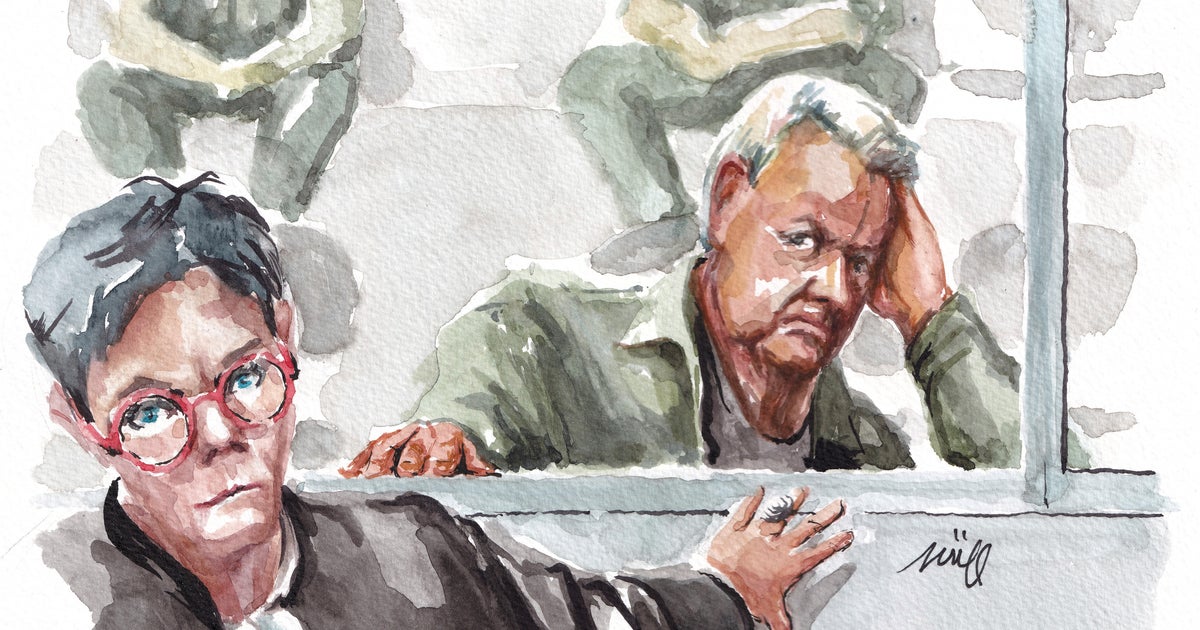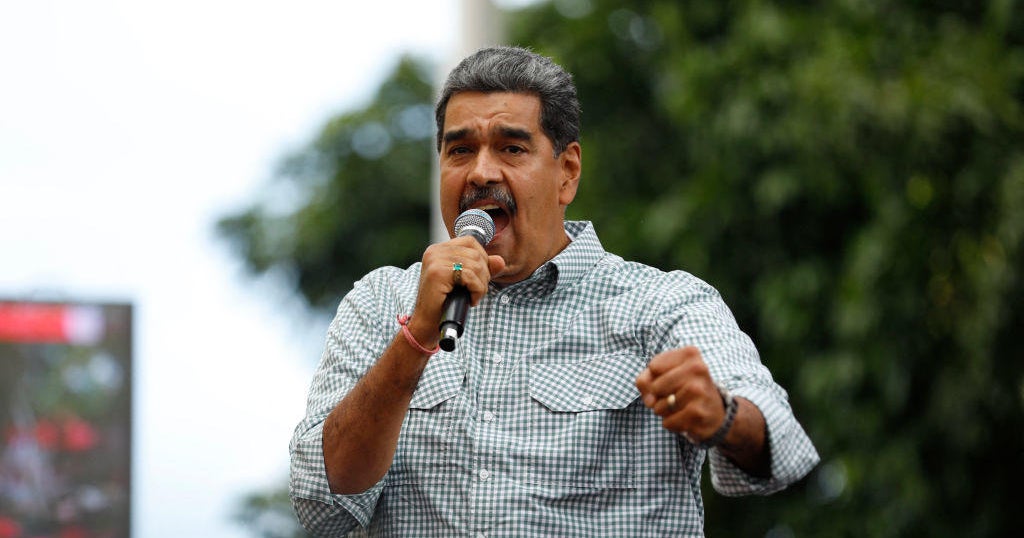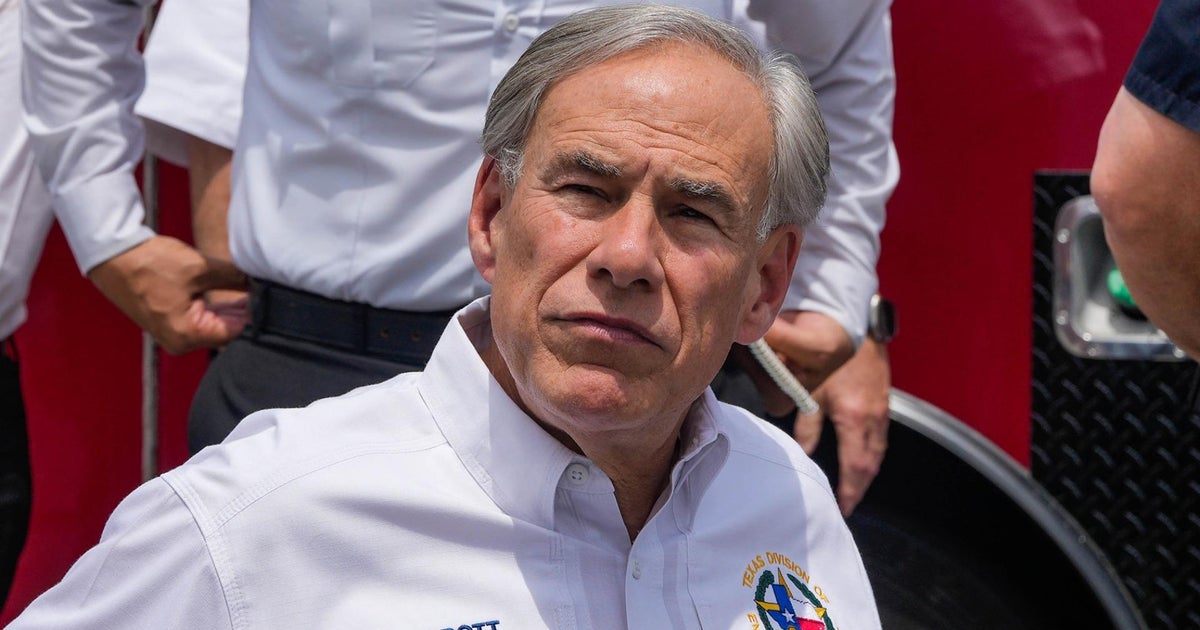CBS News
3 U.S. citizens, 2 Spaniards held over alleged plot to “destabilize” Venezuela

Three American citizens, two Spaniards and a Czech citizen have been detained in Venezuela on suspicion of plotting to destabilize the country through “violent actions,” the government said Saturday, adding that hundreds of weapons had been seized.
Interior Minister Diosdado Cabello said that the five were held on suspicion of planning an attack on President Nicolas Maduro and his government. The arrests come amid heightened tensions between Venezuela and both the U.S. and Spain over Venezuela’s disputed July 28 presidential election, which the country’s opposition accuses Maduro of stealing.
Maduro, a former bus driver, who succeeded iconic left-wing leader Hugo Chavez on his death in 2013, insists he won a third term but failed to release detailed voting tallies to back his claim.
“We know that the United States government has links to this operation,” Cabello asserted. He said the two Spaniards were recently detained in Puerto Ayacucho in the southwest.
He added that three Americans and a Czech national were also arrested and linked the alleged plot to intelligence agencies in the United States and Spain as well as to Venezuelan opposition leader Maria Corina Machado.
An American Navy sailor was detained in Venezuela last week while visiting the country on personal travel, several U.S. officials confirmed to CBS News. The enlisted sailor is a petty officer first class and formerly a Navy SEAL who was assigned to a West Coast team, several U.S. officials and a senior Defense Department official told CBS News. It is not clear if the sailor was one of the three Americans confirmed detained on Saturday.
“They contacted French mercenaries, they contacted mercenaries from Eastern Europe and they are in an operation to try to attack our country,” he said.
He added that “more than 400 rifles were seized” and accused the detainees of plotting “terrorist acts.”
The United States, Spain and the Czech Republic had yet to react to the sensational claims, which come amid a deepening standoff between Maduro and Western powers. A plane belonging to Venezuelan President Nicolás Maduro was seized by the U.S. and brought to Florida, the Justice Department said, claiming the jet was exported from Florida in violation of U.S. sanctions.
Tensions between Caracas and former colonial power Spain rose sharply after Venezuelan opposition candidate Edmundo Gonzalez Urrutia, 75, went into exile in Spain a week ago, after being threatened with arrest.
Earlier this week Caracas recalled its ambassador to Madrid for consultations and summoned Spain’s envoy to Venezuela for talks after a Spanish minister accused Maduro of running a “dictatorship.” Venezuela was also angered by Spanish Prime Minister Pedro Sanchez’s decision to meet with Gonzalez Urrutia and warned Spain against any “interference” in its affairs.
Caracas has additionally been engaged in a war of words with the United States, which recognized Gonzalez Urrutia as the winner of the election. Washington on Thursday announced new sanctions against 16 Venezuelan officials, including some from the electoral authority, for impeding “a transparent electoral process” and not publishing accurate results.
Venezuela denounced the measures as a “crime of aggression” and Maduro decorated four military officers among those targeted by the sanctions. Maduro’s claim to have won a third term in office sparked mass opposition protests, which claimed at least 27 lives and left 192 people wounded.
The opposition published polling station-level results, which it said showed Gonzalez Urrutia winning by a landslide. About 2,400 people, including numerous teens, were arrested in the unrest. After Venezuela’s last election, in 2018, Maduro also claimed victory amid widespread accusations of fraud. With the support of the military and other institutions, he managed to cling to power despite international sanctions.
Maduro’s tenure since 2013 has seen GDP drop 80 percent in a decade, prompting more than seven million of the country’s 30 million citizens to migrate.
contributed to this report.
CBS News
Electric vehicles raise concerns about whether safety infrastructure can handle their weight in a crash

As the number of electric vehicles on U.S. roads continues to rise, concern has emerged about the ability of existing safety infrastructure to handle their increased weight. Guardrails and other roadside safety barriers, typically tested against vehicles weighing around 5,000 pounds, are now being challenged by EVs that often exceed that weight.
In January, a 2021 Tesla crashed into a guardrail on the 405 Freeway in Irvine, California. The vehicle appears to have smashed through the barrier and careened off the roadway, ultimately killing the driver.
Researchers at the University of Nebraska are testing how U.S. infrastructure matches up to EVs. They crashed a 7,000-pound electric pickup — weighing 2,000 pounds more than a gas-powered pickup — at 62 mph into concrete barriers commonly used as freeway medians. The barriers contained the collision, but chunks of concrete were sent flying, and several of the 5,000-pound barriers were pushed back 10 feet — 50% more than normal.
“Unfortunately, these guardrail systems, which have performed very well with gasoline vehicles historically, do not appear to be containing electric vehicles when impacting the similar types of conditions,” said Cody Stolle, a University of Nebraska associate professor who has been studying the issue.
Nebraska Republican Sen. Deb Fischer said there has to be a greater awareness regarding the current standards for guardrails and barriers to encourage further research.
“It was eye-opening. There was a lot of damage. And again, if there would’ve been vehicles on the other side of that barrier, we would’ve seen a severe accident,” said Fischer.
A guardrail is supposed to work by containing a vehicle and redirecting it back toward the road. But in a recent test by the Texas Transportation Institute, a standard guardrail failed when an electric sedan hit it, raising further concerns about the ability of existing infrastructure to handle the heavier weight of EVs.
More than 19,000 people died in crashes where their vehicle left the roadway last year, according to the National Highway Traffic Safety Administration. This makes up nearly half of all traffic deaths. Guardrails and similar roadway barriers are designed to reduce the number and severity of these crashes.
The Insurance Institute for Highway Safety and National Transportation Safety Board Chair Jennifer Homendy are concerned about the additional weight from EVs causing more severe crashes.
“Our guardrails and crash attenuators, they are rated up to 5,000 pounds. Many of these [electric] vehicles go up to 10,000 pounds, so that has an impact on safety,” Homendy said during a Senate hearing in March.
The Environmental Protection Agency estimates that half of all new car sales will be EVs by 2032, leaving limited time to address these concerns and upgrade roadside safety barriers.
CBS News
What to know about exploding pager attacks against Hezbollah

Watch CBS News
Be the first to know
Get browser notifications for breaking news, live events, and exclusive reporting.
CBS News
Associate of Frenchman on trial for mass rape of wife Gisele Pelicot admits copycat abuse of his own wife

A man who says he learned to drug and rape his own wife from Frenchman Dominque Pelicot, who’s admitted to drugging and raping his own former partner for almost a decade, and recruiting scores of strangers to assault her as well, said Wednesday that he deserved to be harshly punished.
“I’m in jail and I deserve it,” the 63-year-old told the court in Avignon where the mass rape trial of Pelicot has been unfolding to the horror of the French and international public.
“What I did is appalling. I’m a criminal and a rapist,” said Jean-Pierre Marechal, a tall man with a buzzcut who claimed he was supplied with tranquillisers by Pelicot.
ZZIIGG/REUTERS
Pelicot, 71, has admitted slipping his then wife Gisele sedatives to render her unconscious so that he and dozens of strangers could rape her.
Gisele Pelicot also testified in the Avignon court Wednesday, saying she felt humiliated by defense lawyers suggesting she could have been complicit in the ordeal.
“Since I have set foot in this courtroom I have felt humiliated,” she said during the trial of her former husband, who stands accused along with 50 other men of raping his wife between 2011 and 2020.
“I’m being called an alcoholic, and someone who gets intoxicated to the point of becoming Mr. Pelicot’s accomplice,” she bristled.
Marechal is the only one involved in the case who is not accused of abusing Gisele Pelicot. Instead, Marechal is accused of raping or attempting to rape his 54-year-old wife Cilia 12 times, with Pelicot accused of taking part in 10 of those assaults after the two men met online.
“What I did is horrible and I want a tough punishment,” said Marechal.
“I regret my actions,” he told the courtroom. “If I had not met Mr. Pelicot, I would have never committed this act. He was reassuring, like a cousin.”
According to prosecutors, after the two men met on a website called Coco, Pelicot started sharing images of his abuse of his wife by the men he’d enlisted, explaining to Marechal how he drugged her. Marechal said he initially refused Pelicot’s invitation to rape his wife, but later changed his mind.
Prosecutors have said Pelicot appears in at least three recordings of 12 assaults on Marechal’s wife Cilia.
Pelicot said he stopped contacting Marechal after Cilia woke up while he was in the room.
Marechal says he had a “happy life” with his wife
Marechal told the court he had been abused by his father as a child.
“My childhood was all shame, alcohol, sex and a lot of silence,” he said. “We experienced terrible things from my father, sexual abuse.”
“My mother tried to protect us but she drank,” he added.
Marechal said he had a “happy life” with his wife after meeting her as a young man. She too told the court last week that it was a happy marriage.
“I love my wife,” he said.
He lived about 30 miles from the Pelicot home in the southern town of Mazan, where the main defendant is accused of abusing his own wife in her bed.
Gisele Pelicot has been lauded globally for waiving her right to anonymity under French law and insisting the trial be open to the public, hoping to raise awareness about the use of drugs to commit sexual abuse.
contributed to this report.









